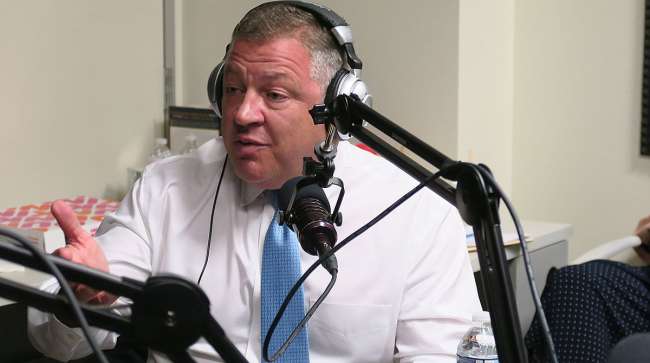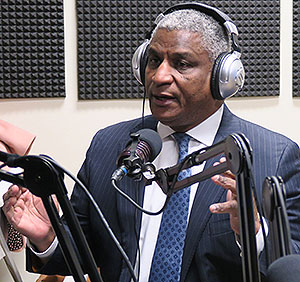Senior Reporter
Former T&I Leader Bill Shuster Touts Fuel Tax, Presses for Leadership

[Stay on top of transportation news: Get TTNews in your inbox.]
With the U.S. House of Representatives readying consideration of a comprehensive highway bill as early as the week of Jan. 27, Bill Shuster, formerly the leader of that chamber’s transportation panel, argued that an increase in the federal fuel tax is an ideal approach for Congress to consider as a means of funding for the measure.
Doing so, he said during a Jan. 22 appearance on Transport Topics Radio on SiriusXM, would promptly inject new revenue into the highway account without saddling motorists with a heavy economic burden.
“When you talk about raising the gas tax everybody gets a little crazy about it,” said Shuster, who became a senior policy adviser with lobbying firm Squire Patton Boggs after leaving Congress last year. Shuster appeared alongside former Transportation Secretary Rodney Slater, also with the firm, for the interview.

Rodney Slater by Joseph Terry/Transport Topics
Shuster acknowledged that his former colleagues continue to struggle to identify a long-term source of funding for infrastructure projects, but said time is not on their side. “We need to invest in our transportation system, and we can’t put it off for another five or 10 years. We need it now. Our economy is growing.”
Approving a sustainable funding approach for big-ticket infrastructure projects eluded Shuster during his time in Congress. Raising the federal fuel tax has not been done since the Clinton administration, and advocacy from the country’s leaders, such as the president, would help advance a funding fix, Shuster explained.
“The key is, it takes executive leadership,” he said. “The president of the United States needs to stand up and explain to the American people, flanked by members of the leadership in the House and the Senate, and say, ‘This is what we’re going to do. This is how we’re going to spend the money. We’re committed to it.’ ”
Shuster had proposed raising fuel taxes to ensure the solvency of the Highway Trust Fund just before leaving office before the start of the 116th Congress. Federal lawmakers have not adopted this proposal, although Shuster’s successor on the committee, Chairman Peter DeFazio (D-Ore.), has been a proponent.
The Transportation and Infrastructure Committee is preparing to unveil a multiyear highway measure that would look to address concerns stemming from climate change, Speaker Nancy Pelosi (D-Calif.) told reporters recently. There has been no mention of a funding fix.
In part one of a two-part exploration of autonomous technology today, our latest RoadSigns podcast revisits conversations with CEOs Alex Rodrigues of Embark and Cetin Mericli of Locomation. Hear them explain what testing automated trucks and developing platooning technology has taught them about the road ahead — and get new perspective with host commentary. Listen to a snippet from Rodrigues above, and to hear the full episode, go to RoadSigns.TTNews.com.
Top Republicans, such as ranking transportation committee member Rep. Sam Graves of Missouri, have suggested adopting a fee-based system of charging for miles traveled. Last year, the Republican-led highway committee in the Senate advanced a multiyear highway bill that left questions about the trust fund to the tax-writing committee.
Slater, who served under President Bill Clinton, noted dozens of states had adopted infrastructure funding plans due to unreliability at the federal level. He explained, “They’ve been able to make the case to the voters, the citizenry. This is what the money is for. This is what we’re going to do with it. This is how we’re going to do it.”
After infrastructure policy negotiations collapsed between top Democrats and President Donald Trump last year, neither side has returned to discussions about a multitrillion-dollar infrastructure package. The Highway Trust Fund relies on insufficient revenue from the federal 18.4-cents-per-gallon gasoline tax and 24.4-cents-per-gallon diesel tax. A funding shortfall is projected near the end of 2021.
Want more news? Listen to today's daily briefing:





